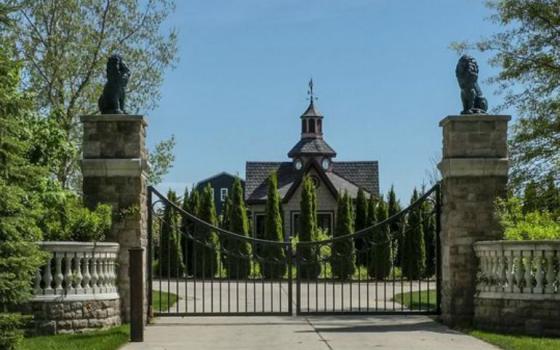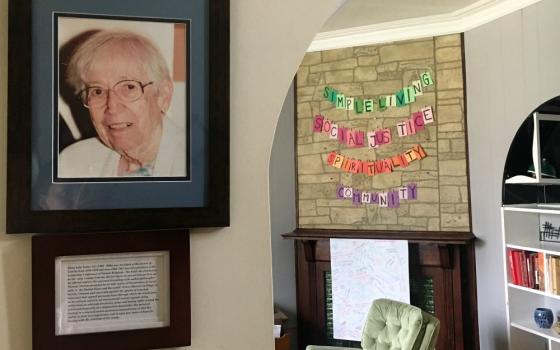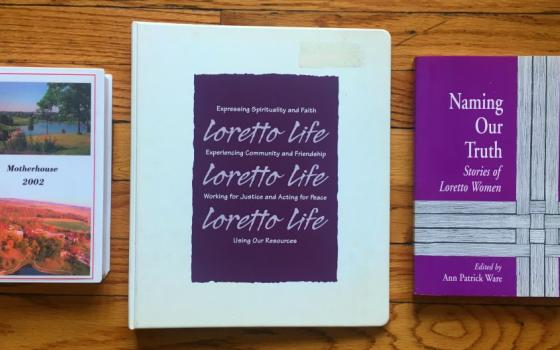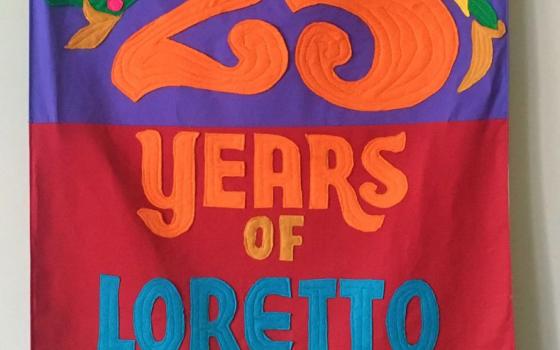Notes from the Field includes reports from young people volunteering in ministries of Catholic sisters. A partnership with Catholic Volunteer Network, the project began in the summer of 2015. This is our ninth round of bloggers: Samantha Wirth is the public policy fellow for Good Shepherd Services in New York City and Adele McKiernan is a Loretto Volunteer at Missouri Health Care for All in St. Louis. This is Adele's final blog post. Read all of their blog posts.
___
Before becoming a Loretto Volunteer, I lived in another intentional community: a historically Jewish co-op in Madison, Wisconsin, called Ofek Shalom, Hebrew for "horizon of peace." There, we grappled with questions of unity and community; namely, how to address the reality that the number of Jewish community members at Ofek had been decreasing.
As the longest-standing member of Ofek Shalom at the time and someone who was not raised Jewish, I talked with my Jewish (and non-Jewish) friends and housemates regularly about how to preserve and honor the history of the house without inadvertently appropriating Jewish culture. We wondered if we should heed the changing demographics of our house and phase in a new era at Ofek that honored our history but no longer put Jewish values at the center of our lives.
We decided preserving the integrity of a historically Jewish home in the upper Midwest and upholding the traditions that were foundational for our existing Jewish members took priority over our own uncertainties. We continued to celebrate Shabbat every Friday, hold a costume party on Purim, host a big Seder for Passover, and collect donations for Young Gifted and Black as part of the Jewish commitment to tzedakah, righting the injustices of society. We did so while holding our cultural diversity in the context of our Jewish customs and balancing the needs of both non-Jewish and Jewish members.
When I came to the Loretto Community in August 2018, I realized a familiar dynamic was occurring here, too. Both my former and current living arrangements have demanded that I engage with existential questions around the demographics, purpose and longevity of my community.
As is the case with many Catholic women religious orders, there have not been newly vowed Sisters of Loretto in recent years. A Global Sisters Report article by Dan Stockman covers the aging and declining number of sisters and the questions sisters and associates, or nonvowed community members, are grappling with. He quotes Kathleen Sprows Cummings, a history professor at the University of Notre Dame: "These trends show how important it is for sisters to communicate their histories and charisms to those who don't take those same vows. This is really a crucial moment. ... It seems to be a turning point."
Loretto is facing not only the loss and repurposing of physical spaces of worship, like the Loretto Center in St. Louis, but the loss of community members themselves as they move from their homes around the country back to where they originally went to become sisters, the Loretto motherhouse in Nerinx, Kentucky. In anticipation of these changes, Loretto has ushered in creative new forms of membership, such as co-membership, Loretto Circle and, of course, the Loretto Volunteer Program, which places young people like me in communities where Loretto sisters have historically lived and served.
Yet big questions still remain about what religious life can look like within Loretto volunteer houses (like Tobin House in St. Louis) in conversation with the cultural context of the larger Loretto community, just as there were and are questions about what Jewish values mean to Ofek against the backdrop of the housing cooperative movement.
To me, both communities, which include so many people who love each other and the life they have chosen, feel poised between loss and hope. A lot seems at stake.
In Ofek, two huge potential losses daunted us: the loss of our Jewish identity as membership declined and the loss of cooperative life in general. When I was there, while we were struggling to decide what to do about our dwindling numbers, we created a library on the second floor, where we displayed photos and art from former members and archived Ofek photo albums, books about Judaism, and old house policy manuals and cookbooks. The creation of the library was collaborative — an exercise in cooperation in itself — and meant to preserve the material history and institutional memory of the house, but it felt more like a solemn memorial to something past than a lively tribute.
Developers in Madison have their eyes on Madison Community Cooperative houses, which are typically well-built and well-situated. As property values and student debt increase, it becomes hard to maintain rent-controlled housing and interest in communal living models. While co-ops can be foundational to combating extractive economic practices and gentrification, they can become complicit in these forces and can be eliminated by them, too.
The Loretto Community is different in important ways — Loretto is a different kind of faith-based community, intergenerational, with women religious and nonvowed members — yet spending my last four years living at Ofek Shalom and then Tobin House has challenged me to grapple with a question that fills both spaces: How can intentional, communal, spiritual ways of living thrive in a hyper-individual and increasingly secular society?
To me, intentional communal living can be an antidote to the isolation we are feeling across the generational spectrum as well as the very real effects of economic strain that are changing millennials' outlook on the housing market and the trajectory of our future generally. Centering spirituality or religion in these spaces can offer room for personal growth, life-giving relationships, and a profound sense of connection to the world and to each other that may feel absent in our current sociopolitical climate.
But still, this kind of living is as difficult as it is countercultural.
One asset Ofek did not have when I was there that I see in the larger Loretto community is diversity in age and life experience. While most of Ofek's members were college students, the Loretto community has volunteers as young as 21 and sisters in their 100s. While Loretto could surely be more racially and economically diverse (a reality we are grappling with), there is a wealth of perspective along the existing spectrum of age and perspective held by sisters, co-members and volunteers that we can tap into as we look at the future of our community.
When communities confront and welcome change, as Loretto has done by evolving to include co-members and volunteers, for example, avenues open for complex conversations, exciting decisions and growth across and along all sorts of divides. Despite the serious challenges facing faith-based communities, we are well positioned to use the resources and wisdom we have inherited from the incredible work done before us in founding and maintaining these communities to evolve into the next iteration of ourselves.
[Adele McKiernan is a Loretto Volunteer in St. Louis working at Missouri Health Care for All as an organizing fellow.]



